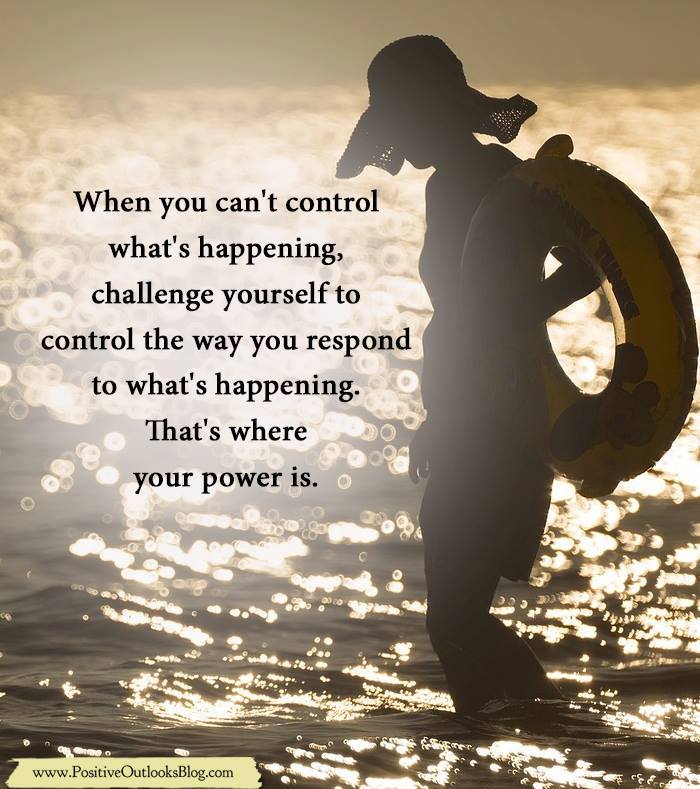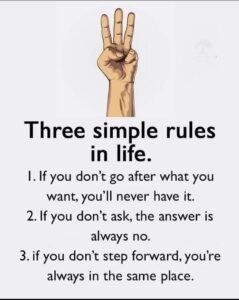 One of the major reasons we are stressed is because we are unable to keep our emotions in check when faced with a dilemma or confusion or problem. We then get overwhelmed, fearful and react impulsively. Our reactions are often in anger, frustration and despondency. Rational behavior takes a back seat, the challenge of the moment looks ominous and damage control is our instinctive allay which then becomes the focus of our attention. If ever one who faced a crisis behaved in this manner, there would be very few who survived disasters. If every researcher adopted the same attitude there would be very few discoveries. Every major war is testimony to the resilience of the vanquished and destroyed, to rebuild and grow despite the severity of their ruins physically, financially and mentally. So what is it that makes the human race change, progress and succeed despite the upheavals, the disasters and the disruptions that seem to perennially confront them?
One of the major reasons we are stressed is because we are unable to keep our emotions in check when faced with a dilemma or confusion or problem. We then get overwhelmed, fearful and react impulsively. Our reactions are often in anger, frustration and despondency. Rational behavior takes a back seat, the challenge of the moment looks ominous and damage control is our instinctive allay which then becomes the focus of our attention. If ever one who faced a crisis behaved in this manner, there would be very few who survived disasters. If every researcher adopted the same attitude there would be very few discoveries. Every major war is testimony to the resilience of the vanquished and destroyed, to rebuild and grow despite the severity of their ruins physically, financially and mentally. So what is it that makes the human race change, progress and succeed despite the upheavals, the disasters and the disruptions that seem to perennially confront them?
The answer lies in how one responds. The key is not to react but to respond. The difference between the two is in how you control your attitude, your thinking and your actions.
Attitude: Do we visualize a problem as a disaster or as challenge to be overcome. It is our attitude that will determine our perception of the challenge on hand. Those who are fearful, those just wanting to plod forward and those who are faint hearted would look at obstacles as useless, irritating and insurmountable. They would then settle for compromise solutions rather than a resolution of the problem. On the other hand those having supreme confidence in their own abilities, those who seek long term solutions and those willing to take on a challenge would approach every problem with a ‘ seek the hidden solution’ attitude. They too would get irritated at times, would feel frustrated momentarily, be tempted to give up. However, they resolve to effectively tackle the challenge even if it takes time, even if they have seek help from others and even if the world around belittles and criticizes their efforts. They have the positive can do – will do attitude.
Thinking : Our attitude will determine how we approach a situation. Those who are positive and determined to find solutions would rein in their negative emotions of fear, anger, disappointment and frustration. Instead they would bring into play their strengths, realign their thinking to seek solutions and refocus their attention on varied possibilities in order to overcome the challenge on hand. The will not hesitate to seek the expertise of others; they would be keen observers and listeners for they are sure there exists a solution that they just need to discover. They do not let the problem slip from their mind but they keep mulling over it to let the subconscious work on it. Their thoughts are focused on responding to the challenge rationally, logically and decisively
Action: There are times when quick action holds the key and there is little time to elaborately think and plan. Emergencies are classical examples be it a natural disaster, a fire, an accident or even events like missing a flight or losing your mobile/ wallet. Even in such situations, the action must not be purely impulsive (it will be largely impulsive when your life itself is threatened like if you are in a building that is on fire, since self preservation is a natural instinctive mechanism for survival) but taken with a calm and cool head. Controlling panic whilst seeking a solution would provide more possibilities. The action must be taken decisively and not tentatively; this is possible when the action plan is based in clear headed thinking and with full awareness of the consequences. The action must be to arrive at a solution with minimum damage.
Try these:
- Pick up a news paper and attempt to solve the crosswords or similar puzzles that appear in it. Your attitude, thinking and action would be reflected in how you respond to this challenge.
- List out three instances when you panicked. What was the final outcome of those situations? What role did you play in each of the given situations?
- Of the three key points listed above which of them is your primary problem.
- Attitude – By nature are you and optimist or a pessimist
- Thinking – Can you think both logically and creatively or do you prefer to follow instructions?
- Action – Are you a self starter or do you like to act as instructed.
This post is courtesy www.actspot.com
You are also invited to visit our Inspirational and Motivational Blog





